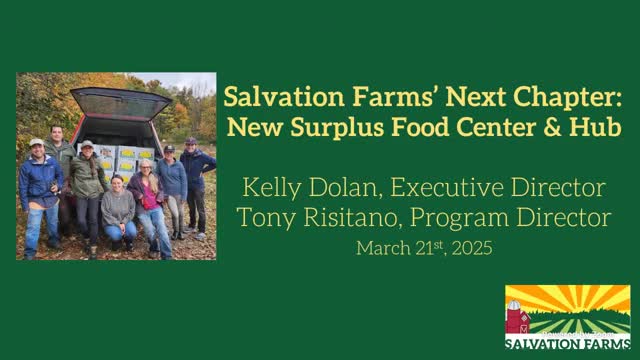Salvation Farms outlines plan for Morrisville food-processing hub to turn farm surplus into school and Meals-on-Wheels supplies
Get AI-powered insights, summaries, and transcripts
Subscribe
Summary
Kelly Dolan, executive director of Salvation Farms, told the Agriculture, Food Resiliency & Forestry committee that the nonprofit has identified a site in downtown Morrisville and is advancing plans to convert a 6,100-square-foot former pharmacy on Congress Street into a food-processing hub.
Kelly Dolan, executive director of Salvation Farms, told the Agriculture, Food Resiliency & Forestry committee that the nonprofit has identified a site in downtown Morrisville and is advancing plans to convert a 6,100-square-foot former pharmacy on Congress Street into a food-processing hub.
Dolan said the hub would “aggregate, minimally process and develop markets and distribution models in collaboration with farms and institutions” so local produce can replace out-of-state food in school kitchens, Meals on Wheels programs and other institutional buyers.
The project is funded in part by a state appropriation of $500,000; Dolan said $400,000 is already in hand and the final $100,000 will be paid as a reimbursement when the project is completed. Salvation Farms also received an award from the Northern Borders Regional Commission and plans additional grants and a fundraising campaign to cover capital and operating costs. Dolan estimated a full year of operations in 2026 would cost about $206,000.
Tony Rizzicano, program director for Salvation Farms, described how the hub would turn “seconds” and surplus harvests into single-ingredient, minimally processed products that save labor for understaffed kitchens. “We do a quick par cook process. We freeze them right on the top,” Rizzicano said of sweet corn processing, adding the hub will package portions in bag-and-box formats suitable for school kitchens.
Farmer partners described the on-farm surplus the hub would use. Richard Horhand, owner-operator of Cabot Smith Farm, said farms often leave cosmetically imperfect or second-grade produce in the field because it is not cost effective to harvest and bring to market. “Last year we gave Salvation Farms 23,000 pounds of squash,” Horhand said, adding that much of what he described as “number twos” is edible but rejected by chain retail standards. Horhand said the program helps clean fields and pay labor to harvest those seconds.
Kim Lipinski, director of Nutrition and Wellness at the Central Vermont Council on Aging, told the committee that minimally processed, single-ingredient frozen products help Meals on Wheels and congregate meal programs meet tight nutritional guidelines and deliver medically tailored meals to older Vermonters. “To get the products minimally processed is really, really important for physical labor reasons,” Lipinski said, noting volunteers in many kitchens are older adults who have difficulty preparing whole produce items.
Salvation Farms described workforce plans tied to the hub. Rizzicano said the organization plans to work with Working Fields, a temporary-placement organization that connects jobseekers with barriers to employment to training and work opportunities, and to provide ServSafe food handling certification and other job-readiness training.
Dolan said the project is undergoing a National Environmental Policy Act (NEPA) review required by the Northern Borders grant and that compliance with Build America, Buy America rules will be part of procurement. She said the NEPA review “can take anywhere from one month to a year” and that, optimistically, the earliest opening could be in the fall if the review and subsequent construction procurement proceed on schedule.
Dolan showed committee members a floor plan the organization has prepared: administrative offices at the front, a central processing area, two coolers and a loading dock at the rear. She thanked the state for the appropriation and invited committee members to the facility opening once it is launched.
The presentation traced Salvation Farms’ history with processing and workforce programs, including earlier pilot work at the Vermont Food Bank, a processing hub in Winooski and prior partnerships with the Department of Corrections and the Food Venture Center in Hardwick. Rizzicano said the organization has developed more than 20 products from 15 crops during recent product-development work at the Montpelier-area Food Venture Center.
No formal committee vote or motion was recorded during the presentation portion of the transcript. The committee asked clarifying questions about processing formats for corn and how the hub would serve institutional menus, and Salvation Farms answered with technical and operational details.
The project’s near-term steps, as stated to the committee, are completing the NEPA review, soliciting construction estimates, complying with Northern Borders grant requirements, and launching operations after construction and fit-up are complete.
